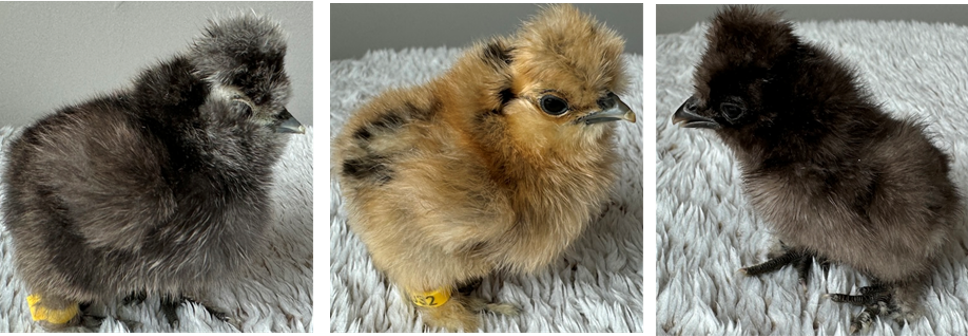Don’t count your chickens before they hatch, DNA test them!
Richard Rosenberger, a silkie breeder in the Netherlands, breeds about 100-150 hens annually. To select female chicks humanely, he developed a method to draw blood from eggs without harming embryos. He then extracts DNA from the blood to determine the sex using PCR, the polymerase chain reaction. Initially, Richard would send samples to local labs that perform DNA sexing tests for a fee. But this cost Richard time and money. Now, with miniPCR and the Zee Wee ITM Bird DNA Sex Test, he’s able to conduct the tests himself at his facility, enabling DNA-based sex determination in ovo – that’s right, before the chicks even hatch!
Interview with Richard Rosenberger
Ethical Poultry Breeding Requires Early Sex Testing
Early sex determination is crucial in chicken breeding. 50% of hatched chicks are roosters, which are less desirable than hens. This creates a moral dilemma, as many breeders are left wondering what to do with the unwanted roosters. Although some might find homes for a few roosters, especially if they show peculiar colors, it’s not always feasible, especially when dealing with large numbers. This challenge can dampen the joy of breeding chickens.
Advanced testing methods, such as hormone or DNA tests, can determine chick sex early in life. However, the ideal solution is pre-hatching sex determination. This allows breeders to selectively hatch hens, saving resources and preventing the culling of male embryos.

Meet Lana3! This cute chick is named from her sample label “Lane 3”, in honor of the first batch of tests run by Richard. During the DNA test, each sample occupies a separate column, generally referred to as “lane”. Lana3 was the first DNA sample processed by Richard and it was run on the third available slot, on lane 3.
(Original gel picture on the left, the arrow indicates the third lane. Picture of young Lana3 on the right).
Why Did You Choose to Do Your Own Tests Rather than Outsource Them?
With the idea of selecting female chickens humanely, I developed a technique for getting blood from the eggs. Initially, I was sending the samples to a local lab for performing DNA testing, but with an increasing number of samples to process, I found it a hassle to pack them up and send them to the lab. It also became expensive and I had to wait days for the results. Possible delays in receiving lab results sometimes meant the chicks had already hatched before I knew their sex, which defeated the purpose of early testing.
Therefore, I searched online for a solution to be able to analyze the samples myself. That is how I found miniPCR. After a few emails with their staff, I ordered both the equipment and the kits for testing 300 samples. I have a mini16X and a blueGel, this setup allows me to run 22 samples in one gel (now that I am experienced).
“miniPCR setup has proven to be highly efficient for my needs, enabling me to process 40-60 samples in a working day.”
Advice for Others Interested in On-Site DNA Testing
Starting DNA testing in-house can be challenging, but it is entirely achievable with the right approach and mindset. The key to success lies in being organized and prepared to learn from mistakes.
When I first embarked on this journey, my background was in electronics, not biology or medicine, so DNA testing was completely new to me. However, the process was made much easier with the help of miniPCR’s support team, who guided me through the learning curve. Their website offers a wealth of information and instructional videos for understanding the basics of DNA testing and troubleshooting common issues.
Using the miniPCR kit requires patience and precision. For example, handling the 26-lane blueGel for sexing requires a steady hand and some practice to get it right.
Although managing on-site testing adds to my workload, the benefits far outweigh the effort. It’s rewarding to have full control over the testing process, from sample collection to analysis. The knowledge that I can provide accurate, timely sex determination for my own chicks and those of fellow hobby breeders adds a great sense of satisfaction. For anyone considering taking on DNA testing themselves, I would highly recommend investing in a reliable system like miniPCR and taking the time to learn the process. The initial investment in equipment and training pays off quickly in both efficiency and the peace of mind that comes with being able to make ethical and informed breeding decisions.


